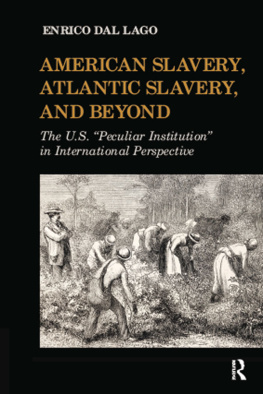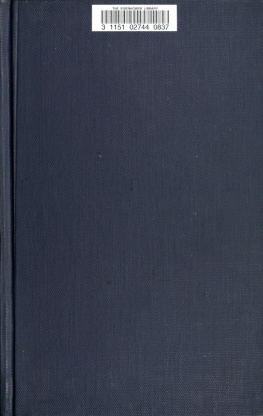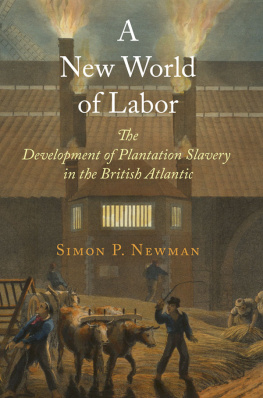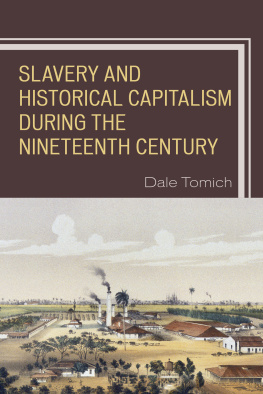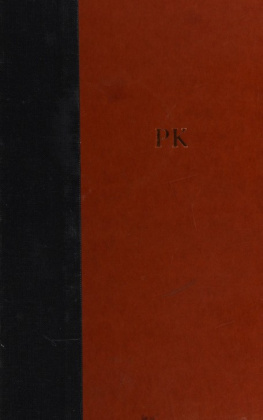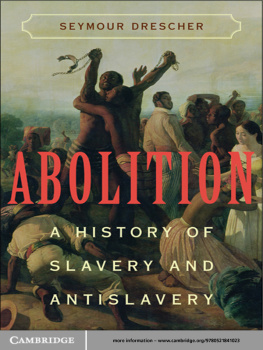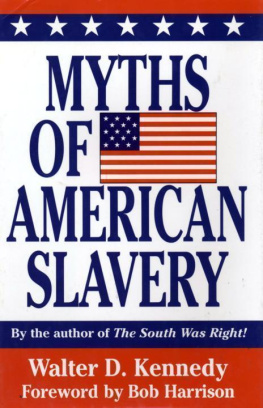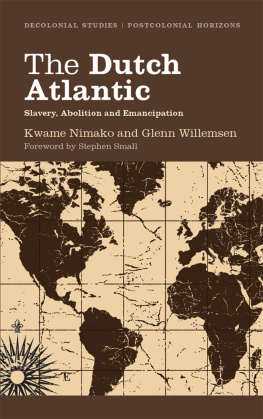American Slavery, Atlantic Slavery, and Beyond
U.S. History in International Perspective
Peter N. Stearns and Thomas W. Zeiler, series editors
NOW AVAILABLE
Revolutions in Sorrow: The American Experience of Death in Global Perspective,
by Peter N. Stearns
From Alienation to Addiction: Modern American Work in Global Historical Perspective,
by Peter N. Stearns
Diverse Nations: Explorations in the History of Racial & Ethnic Pluralism,
by George M. Fredrickson
American Slavery, Atlantic Slavery, and Beyond: The U.S. Peculiar Institution in International Perspective,
by Enrico Dal Lago
FORTHCOMING
American Trade in International Perspective: 1890s to the Present,
by Francine McKenzie
The Global Great Depression and the Coming of WWII,
by John E. Moser
Indians and Invaders: North American Native Peoples in International Perspective,
by Roger L. Nichols
First published 2013 by Paradigm Publishers
Published 2016 by Routledge
2 Park Square, Milton Park, Abingdon, Oxon OX14 4RN
711 Third Avenue, New York, NY 10017, USA
Routledge is an imprint of the Taylor & Francis Group, an informa business
Copyright 2013, Taylor & Francis.
All rights reserved. No part of this book may be reprinted or reproduced or utilised in any form or by any electronic, mechanical, or other means, now known or hereafter invented, including photocopying and recording, or in any information storage or retrieval system, without permission in writing from the publishers.
Notice:
Product or corporate names may be trademarks or registered trademarks, and are used only for identification and explanation without intent to infringe.
Library of Congress Cataloging-in-Publication Data
Dal Lago, Enrico, 1966
American slavery, Atlantic slavery, and beyond : the U.S. peculiar institution in
international perspective / Enrico Dal Lago.
p. cm. (U.S. history in international perspective)
Includes bibliographical references and index.
ISBN 978-1-59451-585-9 (paperback : alk. paper)
1. SlaveryUnited StatesHistory. 2. SlaveryEconomic aspectsUnited
StatesHistory. 3. SlaveryAtlantic Ocean RegionHistory. 4. SlaveryEconomic
aspectsAtlantic Ocean RegionHistory. 5. Cotton growingEconomic aspects
Southern StatesHistory. 6. International economic relationsHistory19th
century. 7. United StatesHistoryCivil War, 18611865Causes. I. Title.
E441.D18 2012
306.3620973dc23
2011042175
ISBN 13 : 978-1-59451-584-2 (hbk)
ISBN 13 : 978-1-59451-585-9 (pbk)
Designed and Typeset by Straight Creek Bookmakers.
This books aim is to provide an interpretive summary of past and present scholarship focused on comparative history of American slavery and to suggest future directions of inquiry. This research field is particularly large and complex, but still full of possibilities for new openings. Some of these openings are presented here as possible avenues for future comparative studies, but there are many more avenues that I have not indicated in my study. In both cases, I hope the suggestions presented here will provide a stimulus to undertake the difficult task of engaging with comparative historical studies of the U.S. peculiar institutiona particularly appropriate expression, since some prominent nineteenth-century southerners used it to describe the specificity of American slavery in comparison with other labor systems.
The introduction to this book provides a general overview of the development of comparative historical studies, with particular reference to the U.S. South and its Euro-American context, from the 1940s to the present. The last pages of the introduction cover the current debates on the relationship between transnational and comparative approaches to the American past.
The book is divided into two parts:
Part A: American Slavery in the Atlantic World focuses on the continental context of colonial, revolutionary, and nineteenth-century American slavery in comparison with New World slave societies, particularly Brazil and the Caribbean. Part A also pays particular attention to American slaverys Atlantic contextin reference to both Europe and Africawith a specific focus on the slaveholding elites ideologies and the lives of the slaves. Both are fields of study in which the comparative and transnational approaches have yielded particularly important insights.
Part B: American Slavery in the Euro-American World is characterized by a wider comparative approach, focusing on Euro-American perspectives on American slavery. Specifically, comparison in Part B focuses on slavery in the nineteenth-century U.S. South, and both contemporary and different forms of unfree and nominally free labor, especially eastern European serfdom and Mediterranean sharecropping and tenancy. Part B also places American abolitionism and the American Civil War within the wider context of Euro-American nationalist movements. In all these cases, the comparative approach has yielded particularly valuable insights, especially on the definitions of freedom and unfreedom and their different meanings in America and Europe.
Ultimately, this book intends to argue that, while focus on the Atlantic context has given us invaluable contributions on the history, development, and characteristics of American slavery, it is now time to acknowledge the equally crucial importance of the wider Euro-American context for a correct understanding not just of the U.S. peculiar institution, but also of American abolitionism and the American Civil War and emancipation within the global nineteenth century of which they were part. In fact, as C. A. Bayly has shown in The Birth of the Modern World (2004), the nineteenth century was truly modern also for the global repercussions of its major economic, social, and political features and events.
ACKNOWLEDGMENTS
I wish to express my sincere thanks to all the institutions and people that have helped me in writing my book. First and foremost, I wish to thank the National University of Ireland, Galways Millennium Fund, under whose project Slave Systems I have conducted part of the necessary research, especially at the Boston Public Library.
I also wish to thank the staff at the Interlibrary Loan services at the James Hardiman Library at NUI, Galway, for their invaluable help, and also, for their support, my Head of Discipline, Professor Steven Ellis, and my colleagues at NUI, Galways History Department, School of Humanities; the former director of the Moore Institute, Professor Nicholas Canny, from whom I have learned a great deal about the Atlantic world over the course of the years; and also the students in the final-year seminar course on Slavery and Emancipation, the past students in the MA in History, to whom I hope I have managed to teach the basics of comparative history and comparative slavery, and my Ph.D. students, all engaged in fascinating comparative and/ or transnational topics.

